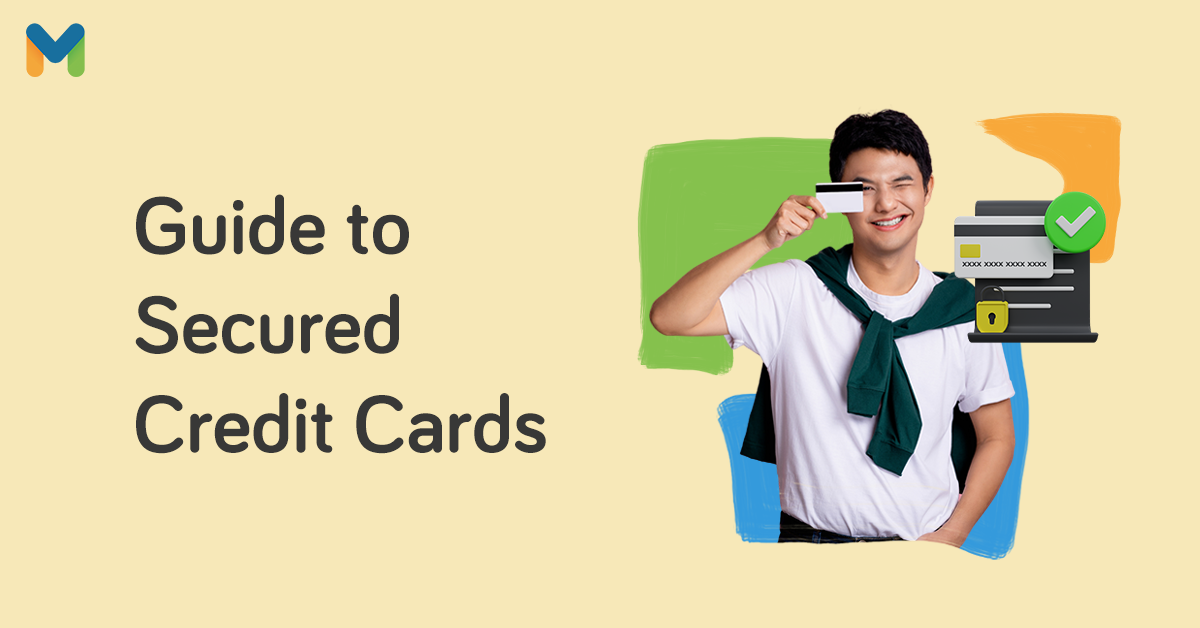"Having a credit card is expensive and often leads to unmanageable debt."
This is a common concern—albeit a big misconception—of the average Filipino about owning a plastic card. But credit cards don't deserve such a bad rep.
Just as money isn't the root of all evil, a credit card won't necessarily drown you in debt. It's all about how you choose and use credit cards.
Credit card bill shock is real, so you must find ways to avoid or manage it. Start by knowing the types of credit card charges in the Philippines.[1] In doing so, you can easily come up with ways to save on your monthly bills.
We’ve listed the most common types of credit card fees and charges. We’ve divided them into two categories for easier understanding. Each fee also includes rates of the major credit card providers.
Credit Card Charges in the Philippines: Service Fees for Card Use/Transactions
-3.png?width=600&height=400&name=Pics%20for%20blog%20-%20600x400%20(23)-3.png)
📌 Annual Fee: ₱300 to ₱6,000
The annual fee is the membership fee you'll pay every year for the convenience of using a credit card. The amount remains the same whether you use your card often or rarely.
Credit Card Annual Fees in the Philippines
| Bank | Credit Card Annual Fee |
|---|---|
| AUB | Free for life |
| Bank of Commerce | ₱1,500 to ₱6,000 |
| BPI | ₱1,320 - ₱5,500 |
| China Bank | ₱1,500 - ₱6,000 |
| HSBC |
|
| Metrobank | ₱2,500 - ₱6,000 |
| PNB |
|
| RCBC |
|
| Robinsons Bank | ₱1,200 - ₱3,000 |
| Security Bank | ₱1,000 - ₱2,500 |
| UnionBank | ₱1,500 - ₱5,000 |
Note that the rates above are just for principal cards. Annual fees of supplementary cards are usually half of the principal cards’ fees.
For example, if you pay ₱1,500 for your principal card’s annual fee, your supplementary card’s annual fee will be ₱750.
How to Avoid Annual Fees
- Apply for or switch to a no-annual-fee credit card. Banks like AUB and Metrobank offer credit cards with free annual fees for life.
- Get a card with a waived annual fee for the first year. If none of the credit cards with zero annual fees matches your needs, the next best option is a card that doesn't charge an annual fee for the first year. At least you'll save thousands of pesos in a year before you start paying the annual fee.
- Redeem your credit card rewards points for an annual fee waiver. If you've accumulated enough reward points, you can use them to waive your annual fee.
- Contact the bank to request an annual fee waiver. It may be worth asking the bank to waive your annual fee if your card is in good standing and you meet the minimum spending requirement within a certain period.
📌 Cash Advance Fee: ₱200 per transaction
Banks charge a fixed service fee of ₱200 every time you withdraw cash from an ATM using your credit card.
Here’s a friendly reminder from the Bangko Sentral ng Pilipinas (BSP): Credit card companies cannot impose other charges on cash advances except for a maximum processing fee.
How to Avoid Cash Advance Fees
As much as possible, avoid making cash advances, especially for non-emergencies. If you need instant cash, pay off your credit card balance to avoid debt. Consider alternatives such as low-interest personal loans.
📌 Foreign Currency Transaction Fee: Varies per bank
If you use your credit card when traveling abroad, you'll be charged a percentage of the overseas transaction amount, automatically converted to Philippine pesos.
Visa, Mastercard, or another credit card network may charge an additional 1% assessment fee.
Foreign Currency Transaction Fees in the Philippines
| Bank | Foreign Currency Transaction Fee |
|---|---|
| AUB | 1.5% service fee |
| Bank of Commerce | 2.5%, including the Mastercard assessment fee |
| BPI | 1.85% of the converted amount, including the Mastercard/Visa assessment fee of 1% |
| China Bank | 2.5%, including the Mastercard assessment fee |
| HSBC | 2.5% of the converted sum plus reimbursement of the assessment fee charged by Visa/MasterCard to HSBC, equivalent to 1% of the converted sum |
| Metrobank | Mastercard/Visa’s assessment fee plus a 2.5% processing fee |
| PNB | 2.5% of the converted amount using Mastercard/ Visa/UnionPay’s conversion rate of the day |
| RCBC | 3.5% (bank’s service fee and Mastercard/Visa/JCB/UnionPay assessment fee) |
| Robinsons Bank | 3% |
| Security Bank | 1% Mastercard assessment fee and 1.5% service fee |
| UnionBank |
|
How to Avoid Foreign Transaction Fees
Find a credit card with a low foreign currency transaction fee. AUB and BPI, for example, charge relatively lower foreign transaction fees. Or pay in cash instead of using your credit card abroad.
📌 Balance Transfer Fee: ₱250 to ₱650 per transaction
If you’re dealing with credit card debt, you may want to transfer all your balance to a new credit card with a 0% interest rate. That way, you’ll be able to reduce the amount of interest you’re going to pay.
Moreover, it will help you pay your credit card debt more quickly. Just keep in mind, though, that balance transfers come with a fee.
Balance Transfer Fees in the Philippines
| Bank | Balance Transfer Fee |
|---|---|
| AUB | ₱250 |
| Bank of Commerce | ₱100 |
| BPI | ₱300 |
| HSBC | ₱650 |
| Metrobank | ₱350 |
| RCBC | ₱250 |
| Robinsons Bank | Varies depending on the amount and installment term |
Read more: 6 Strategies to Manage and Quickly Pay Off Your Credit Card Debt
📌 Gambling/Gaming/Casino Fee: 3% to 5% or ₱500 to ₱1,000 per transaction
If you use your credit card to pay for gaming or gambling activities (e.g., online betting, buying lottery tickets, etc.) in a casino or any similar establishment, you'll have to pay a service fee to your bank.
Gambling/Gaming Fees in the Philippines
| Bank | Gambling/Gaming Fee |
|---|---|
| Bank of Commerce | 5% of the transaction amount |
| BPI | ₱500 or 3% of the gaming transaction, whichever is higher, for every gaming transaction in casinos and/or online betting |
| Metrobank | 5% of the transacted amount |
| RCBC | 5% of every transaction or ₱1,000, whichever is higher |
| Robinsons Bank | 5% of the transaction amount |
| UnionBank | 5% service fee |
How to Avoid Gambling Fees
Gambling is an addicting habit. The convenience of paying with a credit card and spending money you don't have at the casino makes the addiction even worse.
Perennial gamblers don't proactively find ways to avoid shelling out extra bucks to sustain their habit. Concerned family and friends can help these people by monitoring and taking charge of their finances, including credit cards.
If the behavior still doesn't improve, consider canceling the credit card, as gambling is one of the worst reasons to have a credit card.
📌 Charge Slip Retrieval Fee: ₱150 to ₱500 per slip
Sometimes, you spot inconsistencies in your credit card records, which may be a clerical error or a possible sign of fraud. You’ll need to get a charge slip to verify things. However, retrieval of a charge slip or sales invoice comes with a fee.
Charge Slip Retrieval Fees in the Philippines
| Bank | Charge Slip Retrieval Fee |
|---|---|
| AUB | ₱250 - ₱500 |
| Bank of Commerce | ₱300 or US$6 |
| BPI | ₱300 |
| China Bank | ₱500 or US$20 |
| HSBC | ₱275 |
| PNB | ₱400 |
| RCBC | ₱150 |
| Robinsons Bank | ₱500 |
| Security Bank | ₱400 |
| UnionBank | ₱200 |
📌 Card Replacement Fee: ₱400 to ₱1,000 per card
Replacing your lost, stolen, or damaged credit card comes with a fee. In addition, you'll have to spend around ₱150 to ₱300 for the notarial fee, as banks require a notarized affidavit of loss from clients who request a replacement of their lost or stolen credit card.
Credit Card Replacement Fees in the Philippines
| Bank | Card Replacement Fee |
|---|---|
| AUB | ₱500 |
| Bank of Commerce | ₱200 for damaged card, ₱300 for lost card |
| BPI | ₱400 |
| China Bank | ₱500 |
| HSBC | ₱400 |
| Metrobank | ₱400 |
| PNB | ₱400 |
| RCBC | ₱500 - ₱1,000 |
| Robinsons Bank | ₱750 |
| Security Bank | ₱400 |
| UnionBank | ₱400 |
How to Avoid Credit Card Replacement Fee
Keep your credit card safe to reduce the risk of it getting lost, stolen, or damaged. If you're not using it often, leave your card at home.
Credit Card Charges in the Philippines: Penalty Fees
-4.png?width=600&height=400&name=Pics%20for%20blog%20-%20600x400%20(24)-4.png)
📌 Late Payment Fee: ₱250 to ₱1,000 or the unpaid minimum amount due
Making timely credit card payments is as important as paying your bills in full. When you miss the due date, the bank will charge you a penalty fee on your following statement.
On top of that, the late penalty fee is added to the finance charge computation,[2] which further increases the amount you'll have to pay next month.
Credit Card Penalty Late Payment Fees in the Philippines
| Bank | Late Payment Fee |
|---|---|
| AUB | ₱250 - ₱1,000, depending on the payment option, or the unpaid minimum amount due, whichever is lower |
| Bank of Commerce | ₱1,000 or the unpaid minimum amount due, whichever is lower; US$20 for dollar billing |
| BPI | ₱850 or the unpaid minimum amount due, whichever is lower |
| China Bank | ₱750 or the unpaid minimum amount due, whichever is lower |
| HSBC | ₱1,000 or the unpaid minimum amount due, whichever is lower |
| Metrobank | ₱1,000 or the unpaid minimum amount due, whichever is lower |
| PNB | ₱1,000 (Peso) or US$20 (Dollar) or the unpaid minimum amount due, whichever is lower |
| RCBC | ₱850 or the unpaid minimum amount due, whichever is lower |
| Robinsons Bank | ₱750 |
| Security Bank | ₱1,000 (US$20) or the unpaid minimum amount due, whichever is lower |
| UnionBank | ₱1,000 |
How to Avoid Late Payment Fees
Avoid a late payment fee by paying your credit card bill on time. Also, pay off your monthly balances as much as you can. Pay the minimum amount due at the very least.
If you’re dealing with debts from multiple credit cards, you’re also dealing with multiple due dates. To avoid missing due dates, consider consolidating your credit card debts or transferring your balance to a 0% interest credit card. That way, you’ll only have one due date to remember.
See also: No Overspending and Late Payments: How to Manage Multiple Credit Cards
📌 Overlimit Fee: ₱500 to ₱800
A credit card over limit fee is a type of fee the bank charges when you exceed your credit card limit within a billing period. If a bank doesn’t charge an over-the-limit fee, your transaction will be automatically declined when you exceed your credit limit.
Credit Card Overlimit Fees in the Philippines
| Bank | Overlimit Charge |
|---|---|
| Bank of Commerce | ₱500 |
| China Bank | ₱500 |
| HSBC | ₱800 |
| Metrobank | ₱750 |
| PNB | ₱500 or US$10 |
| RCBC | ₱600 or US$12 |
| Robinsons Bank | ₱750 |
| Security Bank | ₱500 |
| UnionBank | ₱500 |
How to Avoid Overlimit Fees
Maxing out your credit card is a big no-no if you're trying to cut down on your bills. It's easy to exceed your credit limit that way.
Each time you whip out your card to buy something, ask yourself: "Can I afford to pay this in cash?" If the answer is no, the purchase isn't worth the trouble.
Also, control your credit card spending. Regularly monitor your billing statements online to ensure you aren't spending more than 30% of your credit limit.
📌 Multiple Payment Fee: ₱40 to ₱50 per payment in excess of maximum transactions
Some banks set a limit on the number of credit card payment transactions within a billing period.
For instance, Bank of Commerce, PNB, and RCBC allow only three credit card payment transactions in a billing period. If you go over that, the bank will charge an additional fee.
Multiple Payment Fees on Credit Cards in the Philippines
| Bank | Multiple Payment Fee |
|---|---|
| Bank of Commerce | ₱50 per payment in excess of three payments within the same cycle |
| PNB | ₱40 per payment in excess of three for all approved payment channels |
| RCBC | ₱40 per payment in excess of three payments within a statement cycle in non-RCBC payment channels |
| Robinsons Bank | ₱40 |
| Security Bank | ₱50 per payment in excess of two payments within a billing cycle |
How to Avoid Multiple Payment Fees
Credit card payments in any of your bank's branches, online and mobile banking facilities, and ATMs are exempted from this fee. Use only the payment channels of your issuing bank when paying your monthly balances.
📌 Installment Pre-Termination Fee: ₱500 to ₱550 or 2% to 5% of the unpaid amount
The bank may charge you a pre-termination fee if you make an advance payment to cancel or pre-terminate your installment plan transaction.
Credit Card Installment Pre-Termination Fees in the Philippines
| Bank | Installment Pre-Termination Fee |
|---|---|
| AUB | ₱500 or 5% of the unpaid principal amount, whichever is higher |
| Bank of Commerce | ₱1,000 |
| BPI |
|
| China Bank | ₱500 or 5% of the unpaid installment balance, whichever is higher |
| HSBC |
|
| Metrobank | 5% of the remaining principal balance or ₱550, whichever is higher |
| PNB | 5% based on the remaining unpaid installment or ₱500, whichever is higher |
| RCBC | 5% of the unpaid amount or ₱500, whichever is higher |
| Robinsons Bank | 5% of the remaining principal |
| Security Bank | 5% of the unbilled portion of the principal amount |
| UnionBank | 5% based on the remaining unpaid installment or ₱500, whichever is higher |
How to Avoid Pre-Termination Fees
Check with your credit card provider or read the terms and conditions to see if the bank charges a pre-termination fee on its installment program. If it does, just continue paying your monthly amortizations until you finish.
📌 Returned Check Fee: ₱100 to ₱1,500 per returned check
Do you make credit card payments through a check? When you issue a check to pay your credit card bills, the bank may return it due to insufficient funds, closed accounts, or incorrect details.
In cases like that, you'll be charged a returned check fee for the inconvenience it caused the bank.
Returned Check Fees on Credit Cards in the Philippines
| Bank | Returned Check Fee |
|---|---|
| AUB | ₱1,000 |
| Bank of Commerce | ₱1,000 |
| BPI | ₱100 for every returned check and an additional 6% of the check amount |
| China Bank | ₱1,000 |
| HSBC | ₱1,000 |
| Metrobank | ₱1,500 |
| PNB | ₱1,000 or US$10 |
| RCBC | ₱1,500 or US$30 |
| Robinsons Bank | ₱1,000 |
| Security Bank | ₱1,250 or US$25 |
| UnionBank | ₱1,500 |
How to Avoid Returned Check Fees
Issuing a check to pay your credit card bill can be a hassle. If you can, avoid it altogether and use more convenient channels for settling your credit card bills, such as your issuer's ATM, online, and mobile banking facilities. You can also pay using your smartphone through mobile payment apps like GCash.
Looking for more tips on how to avoid credit card fees? Check out this video:
Final Thoughts
Always remember that credit cards don’t just give you exciting perks and fun privileges. Owning one is a responsibility, especially with the many types of credit card charges in the Philippines.
An effective way to make credit card payments easier on the budget is to avoid certain credit card charges or at least minimize them. Practicing financial discipline and choosing the right card can help you eliminate some credit card fees from your billing statements.
If you’re shopping for a new credit card, make sure to read the fine print. Usually, you can find information about credit card payments and fees on the credit card provider's website, specifically the Terms and Conditions page.
Sources:
- [1] Table of Fees and Charges (Credit Card Association of the Philippines)
- [2] How to Calculate Your Own Finance Charge (The Balance, 2022)







-Sep-02-2024-04-35-58-0849-AM.png?width=734&height=214&name=image%20(7)-Sep-02-2024-04-35-58-0849-AM.png)
-2.png?width=734&height=214&name=image%20(8)-2.png)


